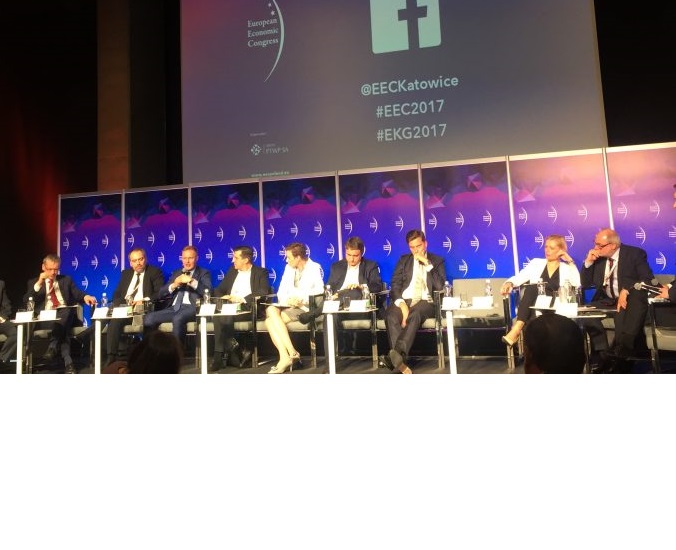EIT InnoEnergy: Innovations and R&D sector at European Economic Congress

The ninth edition of the European Economic Congress or EEC (10-12 May 2017), the largest business event in Central Europe, is behind us.
With 132 sessions, 700 speakers, over 9 000 participants, including 660 media representatives – you have some idea of the scale of the event.
Representatives of EU administration, the Polish government, the national and European parliaments, ministers and deputy ministers from Europe and the world, as well as the chairmen of the largest companies, experts and leaders of opinion – all took part in EEC 2017.
Matters of discussion included the future of the European Union, the unstable global situation, deep changes in the economy, industry, trade and the dynamic development of technology. All from the perspective of companies and the people who form them.
An accompanying event in the ‘Spodek’ Hall, the European Start-up Days, was visited by over 2.5 thousand people. Also the EEC project – Leaders of Tomorrow – saw its continuation, enjoying huge interest among students.
Discussions during the European Economic Congress have confirmed differences in the approach to innovation between large-scale energy companies, manufacturers and technological companies, such as SIEMENS or RAFAKO.
Those first, more traditional companies pay particular attention to technologies that allow one to better understand and satisfy customer needs. This results in the high interest in solutions, for example in the area of Big Data, which serve improvement in the offer both for households as well as for industrial clients.
Technological firms take a different approach to innovation, emphasizing digitalisation and improvement of solutions in order to optimise work parameters in traditional energy generation. These companies see large potential for innovative technologies in the traditional energy sector.
However, it is important to bear in mind the entry barriers, which for new solutions in the traditional energy sector are very large.
'This is confirmed by our data – among the over 2 000 start-ups which have applied to EIT InnoEnergy, only slightly more than 4% propose solutions in the field of energy based on coal and gas,' said Marcin Lewenstein, Innovation Officer at EIT InnoEnergy Poland Plus. – In comparison, over 43% are connected with energy efficiency and smart technologies. This type of innovation is significantly more interesting for start-ups. IT solutions are easily scaled and do not require investment in hardware.
The importance and scale of impact of the traditional energy sector is and will long remain very large. This offers opportunities for technologies which improve efficiency, such as software and IT systems, as well as the monitoring of device operation using sensors.
Meanwhile, large enterprises will either have to rely on their own limited resources or will create opportunities for new types of solutions, including those based on consortiums. Ms Agnieszka Wasilewska-Semail drew attention to the projects that Rafako is realising in cooperation with InnoEnergy, but also for example with TAURON. These include an installation which will allow carbon dioxide to be used in the production of synthetic gas.
However, new technologies connected with conventional generation are much more complicated and difficult due to the nature of this market. A challenge for the energy sector is to create eco-systems enabling the support of new solutions.
'At InnoEnergy we are building such eco-systems based on cooperation with production companies, medium and small-sized businesses, as well as with research institutions and universities,' added Marcin Lewenstein.
Catch up with the latest news from the EIT Community in the Newsroom.
Subscribe to the EIT Newsletter to get the best of the EIT Community's news in your inbox once each month.


 Share this page
Share this page


